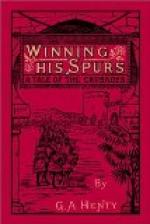From the hour of daybreak, it is said, Richard had not ceased for a moment to deal out his blows, and the skin of his hand adhered to the handle of his battle-axe. This narration would appear almost fabulous, were it not that it is attested in the chronicles of several eye-witnesses, and for centuries afterwards the Saracen women hushed their babes when fractious by threatening them with Malek-Rik, the name which they gave to King Richard.
Glorious as was the success, it was a sad one, for several of the most devoted of the followers of King Richard were wounded badly, some few to death. Among these last, to the terrible grief of Cuthbert, was his friend and patron, the Earl of Evesham. The king, on taking off his armour, hurried to his tent.
“The glory of this day is marred indeed,” he said to the wounded knight, “if I am to lose you, Sir Walter.”
“I fear that it must even be so, my lord,” the dying earl said. “I am glad that I have seen this day, for never did I think to witness such feats as those which your Majesty has performed; and though the crusade has failed, and the Holy City remains in the hands of the infidel, yet assuredly no shadow of disgrace has fallen upon the English arms, and, indeed, great glory has accrued to us. Whatever may be said of the Great Crusade, it will, at least, be allowed by all men, and for all time, that had the princes and soldiers of other nations done as your Majesty and your followers have done, the holy city would have fallen into our hands within a month of our putting foot upon the soil. Your Majesty, I have a boon to ask.”
“You have but to name it, Sir Walter, and it is yours.”
“Sir Cuthbert, here,” he said, pointing to the young knight, who was sorrowfully kneeling by his bedside, “is as a son to me. The relationship by blood is but slight, but by affection it is as close as though he were mine own. I have, as your Majesty knows, no male heirs, and my daughter is but young, and will now be a royal ward. I beseech your Majesty to bestow her in marriage, when the time comes, upon Sir Cuthbert. They have known each other as children, and the union will bring happiness, methinks, to both, as well as strength and protection to her; and further, if it might be, I would fain that you should bestow upon him my title and dignity.”
“It shall be so,” the king said. “When your eyes are closed, Sir Walter, Sir Cuthbert shall be Earl of Evesham, and, when the time comes, the husband of your daughter.”
Cuthbert was too overwhelmed with grief to feel a shadow of exaltation at the gracious intimation of the king; although, even then, a thought of future happiness in the care of the fair young lady Margaret passed before his mind. For the last time the king gave his hand to his faithful servant, who pressed it to his lips, and a few minutes afterwards breathed his last.




